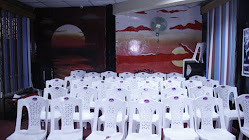Somalia attacks: Anger, helplessness - and a plea to Australia after 'our 9/11'
By Eva de Vries
November 2, 2017 — 3.17pm
Nairobi, Kenya: The truck bomb that exploded in the centre of Mogadishu on
October 14 was the bloodiest such attack in Somalia's history.
While bodies were still being uncovered from the rubble, an attack on a hotel on October 28 killed dozens
more people.
Somalis living abroad are shaken by
the dark turn of events back home.
The death toll from the twin bomb
attack in Somalia’s capital, Mogadishu, has risen above 300.
In Nairobi's Somali neighbourhood of
Eastleigh, also known as "Little Mogadishu", carts laden with fruits
and vegetables are pushed through the streets as the muezzin calls the faithful
to prayer. Veiled women wander from shop to shop collecting the day's
groceries.
But all is not well here.
"Mogadishu is like our big sister," says Iman Burhan, 27, of the youth organisation Eastleighwood. "When our
capital gets hit, it impacts us here as well."
Advertisement
"This attack is the Somali
9/11": Iman Burhan, 27, works with a youth organisation for displaced
Somalis in the Kenyan capital.Credit:Eva de Vries
People fear for their loved ones
back home and business has declined. "It's a lot quieter on the streets
these days," Burhans ays.
I meet up with Hanan Ibrahim, 25, in
her friend Ramah's bright blue bedroom. With tears in her eyes, she tells me
she lost her uncle and cousin in the October 14 attack. "My cousin still
hasn't been found," she cries.
On the wall above her head are the
Arabic words "God is great" and a poster with major prayer sites around
the world. The two friends are both wearing red headscarves to show solidarity
with the victims – red for blood.
Collecting
money
When word of the attack reached
Kenya, Eastleigh residents immediately took action. They gathered in prayer,
collected money for the victims and even donated blood. Around the world, the
Somali diaspora has mobilised to help their relatives back home.
Hanan Ibrahim and other Somali woman
are wearing red headscarves to show solidarity with the victims of the October
14 attack.Credit:Eva de Vries
"This attack rips open the
wounds of the civil war in the '90s," says Ahmed Tohow, director of the
Australian Somali Business Council and representative of the Global Somali
Diaspora organisation in Australia. "We feel hopeless."
Tohow has been living in Melbourne
for 17 years, but he previously worked for several humanitarian organisations
in Mogadishu. Many Somalis in Australia still have family and friends in
Somalia who they keep in touch with daily. Some lost relatives in the attack
and others have seen their businesses completely ruined. "Eventually, an
attack like this touches all of us," he adds.
The horrific aftermath of the
October 14 attack in Mogadishu, which killed hundreds of Somalis.Credit:AP
Truck
blast
The October 14 truck bomb exploded
in the middle of a busy street in Hodan, a neighbourhood in Mogadishu that has
developed quickly over the last few years. It was a Saturday, when the city is
bustling with people out shopping, families eating pizza and cars. The
explosion destroyed everything within a radius of several hundred metres,
leaving at least 358 innocent people dead and more than 500 wounded.
Officially, the attack has not been
claimed by anyone, but reports state that the al-Qaeda-affiliated extremist
movement al-Shabab is behind it. The truck was said to be on its way to the
heavily protected airport, where the United Nations, embassies and the
headquarters of AMISOM
(the African Union Mission to Somalia) are located. Analysts suggest that the
bomb exploded earlier than intended. This would explain why al-Shabab is not
claiming responsibility for the attack, as they don't usually target ordinary
civilians.
"My cousin still hasn't been
found": Hanan Ibrahim, 25, is one of many Somalis living in Kenya affected
by the attacks. The Arabic writing on the wall reads "peace be upon you
and the mercy of God and His blessings".Credit:Eva de Vries
According to Irene Ndungu, Somalia
researcher at the Institute for Security Studies in Nairobi, this attack not
only reveals al-Shabab's access to major bombmaking materials, but also that
they are willing to risk civilian lives to achieve their goals.
"The Somali security institutions
and international partners who cooperate with them should be able to prevent
these kind of attacks," Hussein Moalim Mohamed Sheikh Ali, a former
security adviser to the president, told Reuters. Al-Shabab was ousted from
Mogadishu a long time ago, but apparently the truck driver still managed to
manoeuvre past several military checkpoints. "These attacks are a sign of
a poorly functioning state," Sheikh Ali says.
"Eventually, an attack like
this touches all of us": Somali women living in the Nairobi suburb of
Eastleigh, dubbed "Little Mogadishu".Credit:Eva de Vries
More
attacks
When Somali President Mohamed
Abdullahi Mohamed, also known as "Farmajo", took office at the
beginning of this year, he declared a "total war" against al-Shabab.
He employed a "ring of steel" strategy to make
Mogadishu virtually impenetrable, and at first it seemed to work. However, in
recent months, terrorist attacks have increased both in and outside the city.
"Al-Shabab's promised to launch
more attacks against Farmajo and his allies, which could explain why the
numbers are going up," Ndungu says.
A Somali soldier near the wreckage
of vehicles after the October 28 attack in Mogadishu.Credit:AP
At the beginning of the year, the United States sent troops to assist the Somali
government in the battle against al-Shabab, and Turkey opened a military base in Mogadishu to train the
Somali army. In response, al-Shabab seems to be sending a message that despite
the intensified fight against them, they are indestructible.
In recent years, al-Shabab has kept
a relatively low profile outside Somalia's borders. Yet in 2010, the militant
group launched a deadly attack on hundreds of football fans in Kampala,
Uganda, while they were watching the World Cup final. Seventy-six people were
killed. Three years later, militants killed 60 people at the Westgate shopping mall in
Nairobi. And in 2015, they opened fire on students in the Kenyan city of Garissa, leaving
148 young people dead. Al-Shabab portrayed these attacks as revenge against
countries that had been interfering in the war in Somalia.
"We pray, send money and donate
blood, but these things won't help us defeat al-Shabab," Iman Burhani
says.Credit:Eva de Vries
Obstacles
"Corruption, poor security
services and Somalia's underpaid and poorly trained army are standing in the
way of defeating al-Shabab," says Ndungu.
A few days before the attack, both
the defence minister and the head of the army resigned. To further complicate
the situation, 22,000 AMISOM soldiers are scheduled to withdraw from the
country in 2018 - however Ndungu thinks that the recent attacks mean that
withdrawal is now very unlikely.
On the other side of the ocean,
Tohow is very disappointed in Australia's lack of response. He believes that
the Somali government is too weak, and the African Union and United States are
doing little to improve the situation.
"They can't do it alone. As a
strong and well-functioning state, Australia could contribute to the Somali
army and security services - by providing training, for example."
'This
is the Somali 9/11'
"This attack is the Somali
9/11, only it attracts a lot less attention," Burhani says. He sips a
sweet milky tea in a coffee house on Eastleigh's busiest street. "It's as
if the lives of Somalis are worth less than those of the Americans, British or
French."
With so many international players
tangled up in Somalia's war, he finds it strange that this attack didn't
receive more international attention.
Like Tohow, Burhan hopes for more
external support. "We want to be there for our brothers and sisters in
Somalia. We pray, send money and donate blood, but these things won't help us
defeat al-Shabab."
If the movement is not defeated, he
fears there will be major consequences. "Not only for Somalia, but for the
whole region," he explains.
In the meantime, Ibrahim has given
up her dream of returning to her homeland. She fled to Kenya seven years ago,
but her family is still in Somalia: "I miss them every day, but it's too
dangerous now. I don't want to risk my life."
Source: The Sydney Morning Herld
Subscribe to:
Post Comments
(
Atom
)



















No comments :
Post a Comment